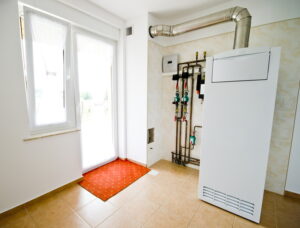The weather is getting colder, the Halloween decorations are out, and it’s time to prepare for winter, so you’ll be ready to hunker down when the icy winds hit. One of the most important things to think about is how your heating system will fare during another long Chicago winter.
The age of your heating system is the main determining factor in when it’s likely to require replacement. Different heating systems have different life expectancies. Boilers are very long-lasting. But exactly how long do boilers last?
Boilers of the Past
Once upon a time, boilers were huge, hulking pieces of equipment. They were made of cast iron and could weigh over 500 pounds. They actually boiled water, as well. It wasn’t hot water that ran through the radiators, it was steam, which meant the boiler dealt with extreme pressures. And yet, these systems were so durable, they could keep working for half a century!
Today’s Boilers
A modern boiler for central heating is quite different from those monstrosities of yesteryear. They’re made of lighter materials and are smaller and less awkwardly-shaped. This makes installation much easier. They’re boilers in name only, because they circulate hot water, not steam, and the temperature is usually well below 200°F. The lower pressure makes them much safer.
But modern boilers will not keep working for fifty years. That might be a disappointment, but there is good news. Your boiler will outlast any other modern heating system. With regular maintenance, it could last for thirty years.
Why Boilers Last So Long
A gas furnace isn’t likely to keep running for much more than fifteen years. Your boiler also burns natural gas. What is so different about a boiler that helps it to last so much longer? There are two very big factors.
First, the cause of retirement for most gas furnaces is corrosion. You might think a boiler, which contains water, would be more likely to rust than a furnace, which does not. But not only are boilers specially coated to protect against rust, they’re safe from the extremely-acidic vapors that occur in gas furnaces and degrade their components much more quickly.
Second, furnaces have a lot of moving parts, and every moving part is a risk point for mechanical failure. Boilers only have one major mechanical component, the circulator pump that forces the hot water to flow. They’re much less likely to require repair. As furnaces age and repairs get more frequent, there comes a point when it makes more sense to invest in a new furnace.
But your boiler will keep on chugging, perhaps lasting twice as long as even a well-maintained gas furnace! And while it’s working, you’ll enjoy a lower risk of repair needs and a higher level of efficiency than you’d get from a gas furnace. So unless your boiler is experiencing major problems or is well past twenty years of age, you should be able to rely on it this winter.
Contact ServiceMax with any questions about your heating system.
